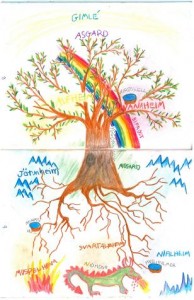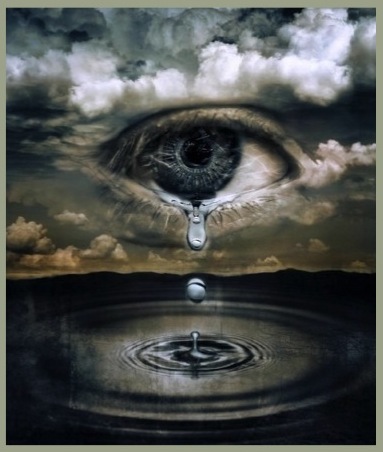I was reading Carl Jung’s sort-of autobiography, Memories, Dreams, Reflections yesterday. I like it because it isn’t a typical autobiography—Jung abhorred the very idea of writing one. It is exactly what the title states: a collection of memories, dreams, and reflections that went to the formation of the person Jung became. He wanted to peal back the layers of himself to see where his Self came from. There are many strange and memorable passages.
In yesterday’s memorable passage, he was discussing his teenage years and an elaborate fantasy he used to entertain himself with on walks to and from school, a kind of alternate reality where all of the Alsace was one giant lake:
There would be a hill of rock rising out of the lake, connected by a narrow isthmus to the mainland, cut through by a broad canal with a wooden bridge over it, leading to a gate flanked by towers and opening into a little medieval city built on the surrounding slopes. On the rock stood a well-fortified castle with a tall keep, a watchtower. This was my house.
He goes on to describe a rather neat and spare little tower, with small but comfortable rooms, weaponry, canons, men-at-arms, and a great library “where you could find everything worth knowing.â€
The nerve center and raison d’être of this whole arrangement, he goes on to say, was the secret of the keep, which I alone knew….Inside the tower, extending from the battlements to the vaulted cellar, was a copper column of heavy wire cable as thick as a man’s arm, which ramified at the top into the finest branches, like the crown of a tree or—better still—like a taproot with all its tiny rootlets turned upside down and reaching into the air. From the air they drew a certain inconceivable something which was conducted down the copper column into the cellar. Here I had an equally inconceivable apparatus, a kind of laboratory in which I made gold out of the mysterious substance which the copper roots drew from the air….One was not supposed to look into it too closely, nor ask what kind of substance was extracted from the air….What the roots absorbed and transmitted to the copper trunk was a kind of spiritual essence which became visible down in the cellar as finished gold coins. This was certainly no mere conjuring trick, but a venerable and vitally important secret of nature which had come to me I know not how and which I had to conceal not only from the council of elders but, in a sense, also from myself.
This reminds me of Yggdrasil, the Norse Tree of Life, which Jung possibly had rattling around in his Germanic subconscious, but I like his actualization of the concept. I couldn’t help thinking what a terrific idea this was, that perhaps I should “steal†it (with full and proper attribution, of course) and adapt it. I’m not much of a high-fantasist, alas, and I’ve become somewhat disenchanted with steampunk, so I don’t really know what I am these days, except perhaps the crock at the end of the rainbow, sans the gold.
Jung goes on to say, This highly enjoyable occupation lasted for several months before I got sick of it. Then I found the fantasy silly and ridiculous.
Ah, I thought. Mid-novel ennui. I know that well enough. If any of you would like to “adapt†this idea yourselves, please remember to pay homage to Carl Jung’s imagination.
There are many images of Yggdrasil, but I like the one below best, done by one of the students at Emerson Waldorf School, Chapel Hill, NC.



